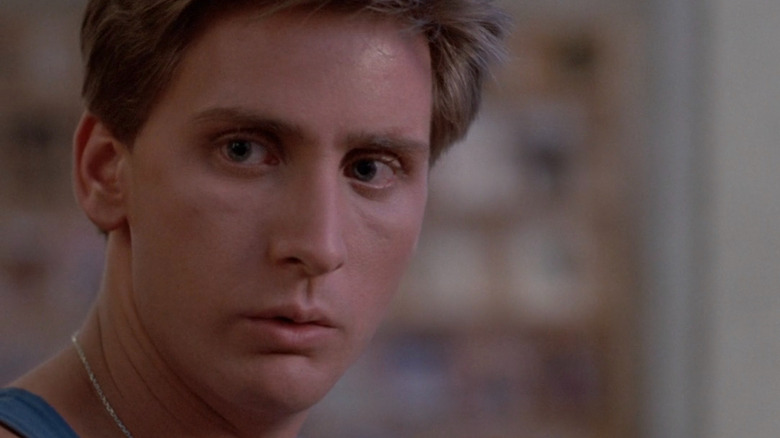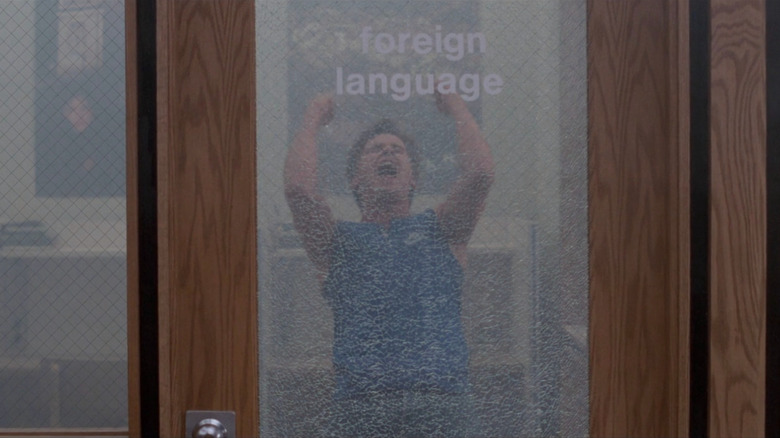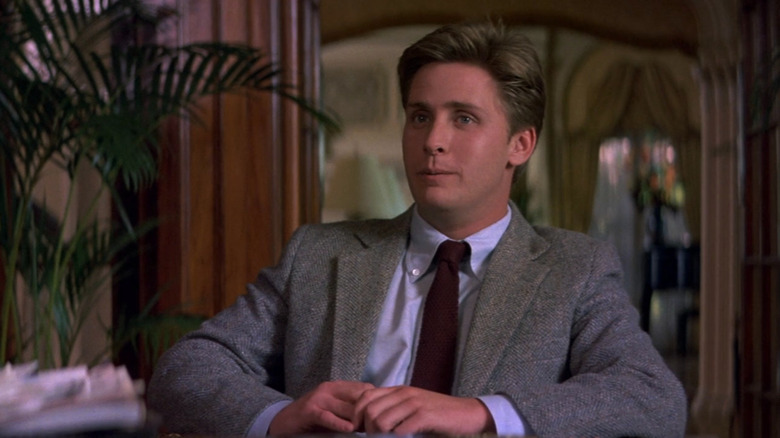Why Emilio Estevez Thinks The Breakfast Club Turned Out Better Than St. Elmo's Fire
The Brat Pack are a fascinating cultural object. Sure, the idea of having young, hot movie stars is nothing new, but the idea that they all operated basically within the same circle, constantly working with each other over and over again, is rather unusual. The 1980s saw a massive rise in movies targeted to teenagers, and the Brat Pack were the people they cut out of magazines and plastered all over their bedroom walls. Molly Ringwald, Rob Lowe, Andrew McCarthy, and more spoke to a whole generation of angsty teens. And perhaps the true poster boy for the Brat Pack was Emilio Estevez.
The main reason for his status was he appeared in two core texts of the Brat Pack: John Hughes' "The Breakfast Club" and Joel Schumacher's "St. Elmo's Fire," both released in 1985. Ally Sheedy and Judd Nelson appeared in both films as well, but they were true character actors, playing quite different roles in the two pictures. Estevez was much more of the classical, handsome leading man who had more depth than the character was usually afforded.
"The Breakfast Club" has obviously had a massive cultural tail, and it remains one of the seminal teen movies of all time. As someone not particularly taken with the more youth-oriented cinema of the 1980s, I cannot deny that the film contains some riveting drama and digs at some human truths. "St. Elmo's Fire," on the other hand, does not have close to the same reputation as its '85 counterpart, despite being such an important cultural piece at the time. As for why that is the case, all you need to do is ask Estevez to understand why one fares so much better than the other.
It's all about context
The key difference between the characters in "The Breakfast Club" and "St. Elmo's Fire" are their ages. "The Breakfast Club" is obviously about a group of high school teenagers, whereas "St. Elmo's Fire" follows a bunch of college graduates. Both films traffic in extreme emotions in how they feel about the future, sex, and just about everything else. In an interview with The Guardian, Emilio Estevez looked back at the two Brat Pack staples and said of Joel Schumacher's film, "It's so overdramatic," and, "It's not a great film." He concedes that "The Breakfast Club" is overdramatic as well, but the context as to why the characters are heightened makes all the difference to him. He continued to The Guardian:
"I think the [school] setting allowed for us to give those kinds of performances, and John [Hughes, 'The Breakfast Club''s director] allowed the time for us to get under the skin of those characters, and as a result it's a superior film."
When you are a teenager, everything that happens to you becomes the most important thing that has ever happened. You do not have enough life experience yet to properly contextualize the things you experience in life. In "St. Elmo's Fire," they are still young, but they are transitioning into proper adulthood. Having the characters pitched at the same level makes them seem unreasonable or obnoxious rather than authentic. A crazy flourish like Estevez's Andrew releasing so much pent-up energy while high, resulting in a glass window spontaneously breaking, would only feel earned in "The Breakfast Club."
Also, Kirby is a creep
The more problematic elements of the films are also more understandable when they are done by adolescents. Judd Nelson's John Bender treats Molly Ringwald's Claire pretty terribly in "The Breakfast Club," including sticking his face between her legs without her consent, but by the end, she kind of falls for him. However, we are never meant to find the things he does to her charming or good. It is their further understanding of one another that brings them together, despite the abhorrent behavior. Of course, that presents other questions you have to wrangle, but this is why it is important they are teenagers. Teens are messy.
In the case of Emilio Estevez's Kirby in "St. Elmo's Fire," we are meant to find him stalking and forcibly kissing Andie MacDowell's Dale to be as alluring as the character herself. This trope of the guy who obsesses over and stalks a woman to prove his love for her runs rampant in the 1980s, and we still see it plenty today. They want us to believe these women love the attention instead of the truth, which is they couldn't be more scared and creeped out by it. Kirby falls right in line with this harmful trope that warped so many people about how to treat the people you are attracted to. Estevez even says in that interview about his "St. Elmo's Fire" role:
"If they were to remake that movie now they would never include that character."
There was talk about a TV remake of "St. Elmo's Fire" a few years back that never came to fruition, so we can't test Estevez's hypothesis. I would hope it would have been proven true. If not, Kirby better had been a radically changed character.


